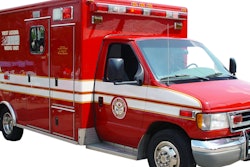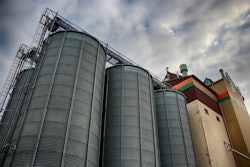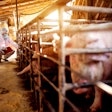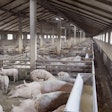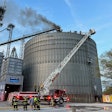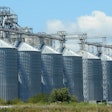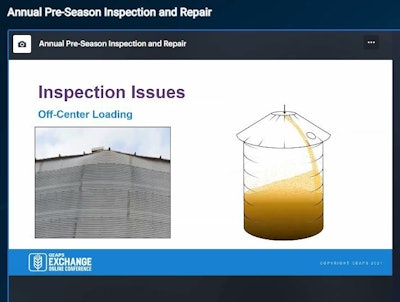
During Tuesday'sGEAPS Exchange Online Conference, Michael Blough, project engineer withClear Creek & Associates, Goshen, IN, gave some tips for what to look for during your annual pre-season bin inspection.
Some items to look for:
- Steel bin corrosion, which can occur along the base of the bin where moisture and material builds, buckling of stiffeners, loss of grout pad
- Any repairs on stiffener sections should match so load energy is transferred effectively
- Stiffener overlap which can cause sheet buckling
- Anchors in concrete should be away from the edge, preferably in the center on stem wall; look for cracks around anchor bolts
- Exposed thread minimums on a new bolted connection should have two threads exposed
- Thread engagement -- if the anchor bolts are not long enough during construction, it may require a replacement
- Loose or missing anchor nuts
- Uplift anchors should not pull out; test the uplift anchors by pulling or kicking them to see if they move
Other items to inspect:
- Sheet failures including bolted connections, bearings, tension rupture/tearing and shearing of bolts
- How the grain bin is filled -- watch for off-center loading which can cause protruding walls, buckled stiffeners and even bin collapse
- Peak loading -- be mindful of peak capacity when adding new components. When wind or snow loads are added, damage can occur from the additional peak loads
- Concrete -- look for exposed steel, cracking, moisture infiltration and delamination
- Guy wires to equipment should be anchored to the most proper component, not just the nearest component
- Structural members, including interference with flow, modifications made during the season that need proper attention, damaged flanges, buckled members on towers, structural integrity
"These recommendations are designed for a first-level assessment -- to catch things before they get worse," says Blough. "You may need a qualified engineer to know how to repair the the issues you find."
For the full educational session,click here.GEAPS ExchangeEducation Sessions will be available online for 30 days and can be viewed with a registration.

Michael Blough, project engineer withClear Creek & Associateswas raised in northern Indiana and attended Purdue University to study civil engineering. He holds both a bachelor’s degree and master’s degree in civil engineering with an emphasis in structural engineering from Purdue. Michael started working for Clear Creek in 2011. Clear Creek & Associates has two main services – manufacturing support and commercial grain facility design.





